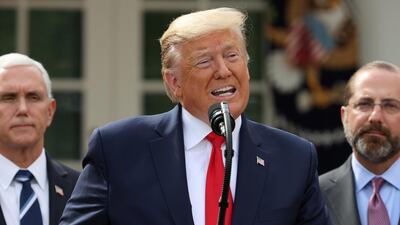US President Donald Trump declared a national emergency over coronavirus on Friday in what critics say was a long-delayed admission of the gravity of the crisis.
President Trump’s declaration frees about $50 billion (Dh184bn) in disaster relief funds for local authorities. He also surprised reporters at a press conference by saying he would “most likely” be tested for the virus, reversing his position from only minutes earlier.
The US president also suggested that the European travel ban could be expanded to include a restriction on travel from the United Kingdom, after the World Health Organisation said Europe had become the new epicentre of the pandemic.
With the US toll now at 47 dead and more than 2,000 infected, the coronavirus is wreaking havoc on daily life – and Mr Trump has struggled to show he is in charge.
In the economic and cultural engine of New York, the state’s governor restricted gatherings of more than 500 people. Cultural institutions including Broadway theatres went dim.
In California, even small events were allowed to proceed only if organisers could ensure two metres of space between each participant, while gatherings of more than 250 people were banned until to the end of the month.
Governors nationwide took similar steps, many declaring states of emergency and shutting schools and college campuses. Millions of pupils and university students are using virtual classrooms to study from home.
Millions of office workers were also being asked to work from home to slow the spread of the virus. Later on Friday, a ban on travellers from most of the European Union was to take effect, contributing to the near-emptying of airports.
Coronavirus also forced a slowdown as the US election became heated, with Democratic rivals Joe Biden and Bernie Sanders cancelling rallies and Louisiana becoming the first state to postpone its primary election next month.
“The next eight weeks are critical,” Mr Trump said in the White House Rose Garden. “We can learn and we will turn a corner on this virus.”
His press conference came after a widely panned national address on Wednesday, in which Mr Trump not only failed to calm growing nerves but delivered serious factual errors.
A massive stock market sell-off followed, whereas on Friday the Dow Jones rose sharply while Mr Trump spoke.
But Mr Trump once more insisted the US response has been faultless, brushing off fierce criticism over his persistence in downplaying the coronavirus danger and the slow introduction of testing for the virus.
“I don’t take responsibility at all,” he said. He’d inherited a system that was not prepared, he said.
Mr Trump surprised reporters by reversing his insistence on not needing to be tested for coronavirus or going into self-quarantine, following his contact with numerous politicians who since took the precautionary measure.
“I don’t have any of the symptoms” and “we don’t want people without symptoms to go and do the test,” he said. Later, though, he said: “I didn’t say I wasn’t going to be tested”.
He said it was “most likely” he would be tested “fairly soon”.
Baseball fans were told the 2020 season would be postponed, and the NBA announced an indefinite suspension of the basketball season. The PGA Tour, Major League Soccer and the National Hockey League all followed suit.
The historic Boston Marathon was postponed, and the wildly popular “March Madness” collegiate basketball tournament was cancelled.
The sweeping cancellations, suspensions and lockouts is unprecedented in the history of modern US sports, with only the shutdown following the September 11, 2001 attacks coming close.














